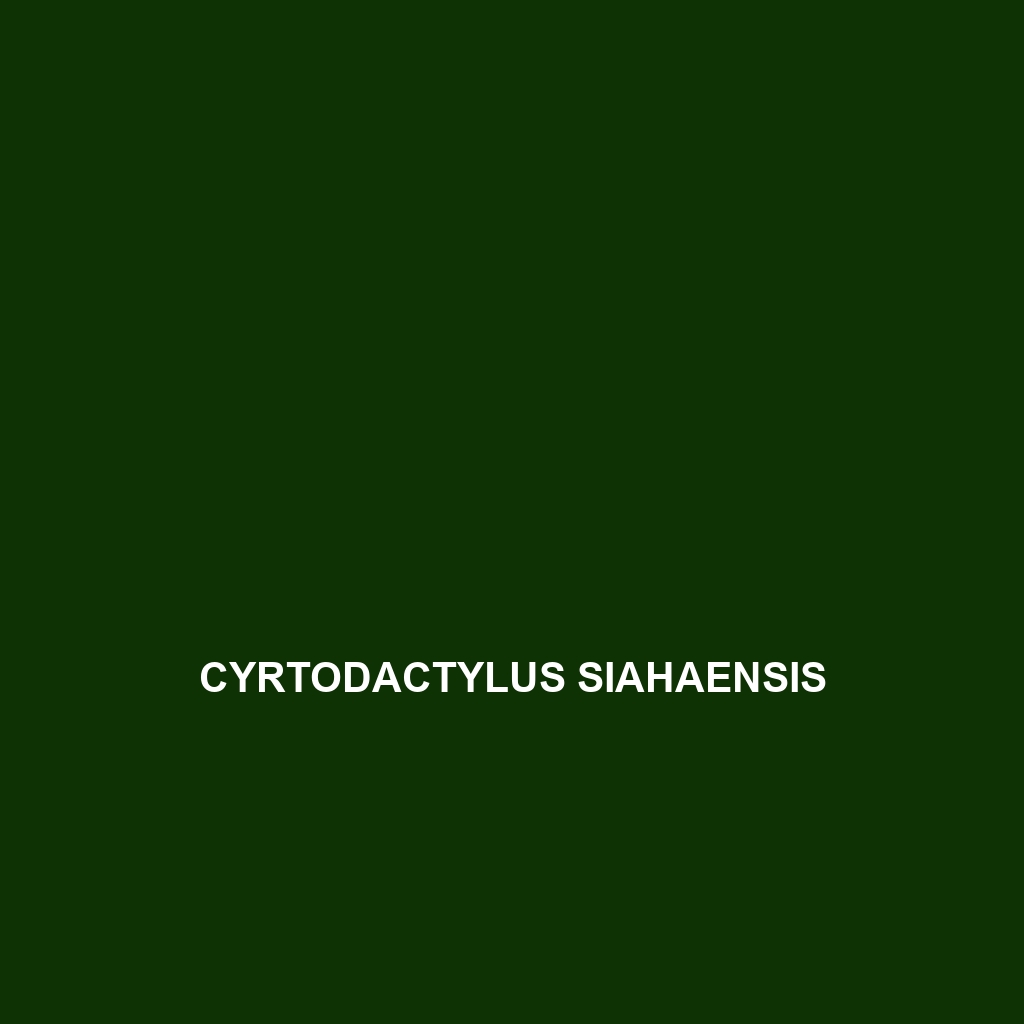-

Cyrtodactylus sonlaensis
Cyrtodactylus sonlaensis, a vibrant gecko from Vietnam’s limestone karsts, known for its agile movements and insectivorous diet. This vulnerable species thrives in humid tropical forests and showcases remarkable adaptations such as tail regeneration, playing a crucial role in its ecosystem.
-

Cyrtodactylus soba
Cyrtodactylus soba captivating Cyrtodactylus soba, a nocturnal gecko native to the humid forests of Thailand and Malaysia, known for its distinctively patterned skin and impressive climbing abilities. This agile insectivore thrives in tropical climates, playing a crucial role in maintaining the balance of local ecosystems while displaying fascinating behaviors like color change and tail regeneration.
-

Cyrtodactylus siahaensis
Cyrtodactylus siahaensis, or Siaha bent-toed gecko, a vibrant Southeast Asian species known for its slender body, distinctive camouflage, and nocturnal habits. This vulnerable gecko thrives in humid forest habitats, playing a crucial role in controlling insect populations while exhibiting remarkable climbing abilities.
-

Cyrtodactylus sangi
Cyrtodactylus sangi, a nocturnal gecko native to the tropical forests of Southeast Asia, characterized by its light brown to olive green coloration with dark blotches, and its impressive climbing abilities. This fascinating species plays a vital role in its ecosystem, controlling insect populations while being a key part of the food web.
-

Cyrtodactylus saiyok
Cyrtodactylus saiyok, a vulnerable gecko species native to the limestone karst habitats of western Thailand, averages 10 to 15 cm in length and features a distinctive elongated body with brown or gray coloration, enabling it to blend into its rocky environment. Primarily nocturnal, it preys on insects and plays a crucial role in maintaining ecosystem…
-

Cyrtodactylus ranongensis
Cyrtodactylus ranongensis, a vulnerable species of gecko endemic to the tropical rainforests of Ranong, Thailand. With a strikingly camouflaged body, nocturnal behavior, and a diet primarily consisting of small insects, this species plays a vital role in maintaining ecological balance within its habitat.
-

Cyrtodactylus quadrivirgatus
Introducing the Cyrtodactylus quadrivirgatus, commonly known as the Four-striped Ground Gecko, this distinct species measures 15 to 20 cm in length, featuring four prominent longitudinal stripes and a secretive, nocturnal nature. Found in Southeast Asia, it primarily feeds on insects and plays a vital role in maintaining insect population balance within its tropical habitat.
-

Cyrtodactylus phuquocensis
The Cyrtodactylus phuquocensis, or Phu Quoc bent-toed gecko, is a slender, nocturnal insectivore native to the humid tropical forests of Phu Quoc Island, Vietnam, characterized by its distinctive light brown or grayish dorsal pattern and adhesive toe pads. Currently classified as vulnerable, this fascinating species plays a crucial role in maintaining the ecological balance by…
-

Cyrtodactylus pinlaungensis
Cyrtodactylus pinlaungensis, a medium-sized, nocturnal gecko native to the moist tropical forests of southeastern Myanmar. With its striking light brown coloration and distinctive striped patterns, this vulnerable species plays a key role in controlling insect populations and maintaining ecological balance in its habitat.
-

Cyrtodactylus phamiensis
Cyrtodactylus phamiensis, a robust gecko native to the tropical forests of Southeast Asia, known for its agile climbing ability, muted coloration for camouflage, and vital role in controlling insect populations. This nocturnal species lays 1-2 eggs per breeding season and is currently considered vulnerable due to habitat loss.
Search
Popular Posts
-
Lygosoma corpulentum
Discover the Lygosoma corpulentum, or fat skink, a robust insectivorous lizard native to Southeast Asia’s moist tropical rainforests and varying habitats. With a stocky body, impressive camouflage, and remarkable adaptability, this ovoviviparous species plays a crucial role in maintaining ecological balance.
-
Lygosoma boehmei
Lygosoma boehmei is a slender, nocturnal insectivore found in humid tropical rainforests and savannas of Southeast Asia, exhibiting a smooth, camouflaging texture and remarkable burrowing abilities. This vulnerable species plays a crucial role in its ecosystem by controlling insect populations and serving as prey for larger predators.
-
Lygosoma bampfyldei
Lygosoma bampfyldei, commonly found in tropical and subtropical regions, is a moderately sized lizard measuring 15 to 25 cm, known for its elongated body and glossy, camouflage coloration. This insectivorous species thrives in moist habitats and plays a vital role in maintaining ecological balance by controlling insect populations.
Categories
Tags
animal adaptations (924) animal behavior (5000) animal reproduction (865) behavior (920) biodiversity (7853) conservation (1670) conservation efforts (1778) conservation status (5748) diet (2104) ecological balance (2087) ecological role (1952) ecosystem (1469) ecosystem role (2901) endangered species (2514) habitat (3280) habitat conservation (1136) Habitat Destruction (1421) habitat loss (3385) herpetology (870) insectivorous reptiles (948) IUCN Red List (1971) lizard behavior (881) lizard diet (944) lizard reproduction (1101) nocturnal animals (2754) nocturnal behavior (2592) nocturnal reptiles (1061) physical characteristics (2058) predator-prey relationships (927) reproduction (2890) reptile behavior (1037) reptile conservation (1348) reptile reproduction (1069) rodent species (1325) seed dispersal (2145) Seed Disperser (979) small mammals (1168) snake behavior (952) snake diet (1061) snake reproduction (1129) tropical forests (948) Vulnerable Species (4926) wildlife (2511) wildlife conservation (5355) wildlife protection (1008)


